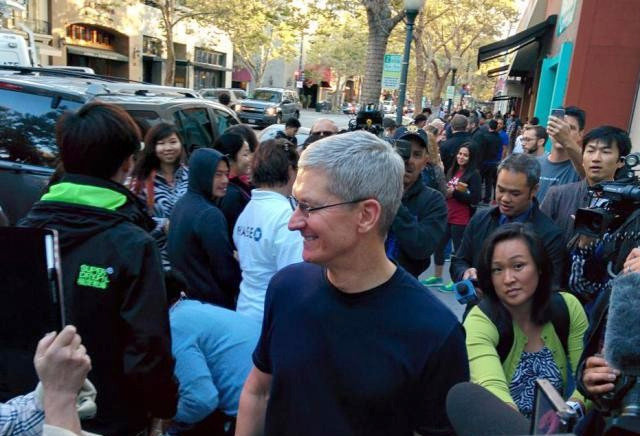CEO Tim Cook talks Apple Watch, Apple corporate culture in new interview
In an interview published Wednesday, Apple Chief Executive Tim Cook discussed a slew of topics ranging from Apple corporate culture, to the prospects for the Apple Watch, to whether the company's all-encompassing product ecosystem is still manageable.
Speaking with Fast Company, Cook claimed that his company is continuing to follow many of the philosophies set by co-founder Steve Jobs.
"Steve felt that most people live in a small box," he said. "They think they can't influence or change things a lot. I think he would probably call that a limited life. And more than anybody I've ever met, Steve never accepted that."
Cook also reiterated the position that Apple is more concerned with making the "best products in the world," rather than focusing on quantity or sales numbers.
"When Apple looks at what categories to enter, we ask these kinds of questions: What are the primary technologies behind this? What do we bring? Can we make a significant contribution to society with this? If we can't, and if we can't own the key technologies, we don't do it," he added. "That philosophy comes directly from him [Jobs] and it still very much permeates the place."
Apple regularly acquires other companies as it prepares to introduce new products and features. The Beats takeover, for instance, is expected to lead to an on-demand iTunes music service.
On the Apple Watch, Cook said that the main mistake committed by other smartwatch makers is relying on smartphone gestures, rather than creating an interface uniquely tailored to a small screen.
"Try to do those [phone gestures] on a watch and you quickly find out they don't work," he noted. That led to the creation of concepts such as Force Touch, which triggers different UI elements based on how firmly someone presses down on the display. The technology is already spreading to MacBook trackpads, and could come to the iPhone.
The CEO argues that the Apple Watch will be the "first modern smartwatch — the first one that matters," and that the people skeptical of its cost, usefulness, and market demand aren't much different from those who doubted the iPod. Regardless, in contrast with the iPhone, Apple isn't setting any marketshare goals.
"The watch needs the iPhone 5, 6, or 6 Plus to work, which creates a ceiling. But I think it's going to do well. I'm excited about it. I've been using it every day and I don't want to be without it," Cook commented. He also suggested that third-party app support would be essential to success, which is why WatchKit was released to developers last November.
When asked if the Apple product ecosystem is beginning to become unwieldy, since it now combines hardware, software, media content, and cloud services, Cook contended that Apple is avoiding the mistake of Microsoft by being willing to abandon from older technologies like DVD drives and 30-pin connectors.
He nevertheless admitted that as much as Apple tries to hide the complexity and engineering difficulty of its ecosystem from users, there are gaffes. "But that, too, we will fix," he charged.
He also acknowledged that Apple, like Steve Jobs, has sometimes flipped positions on topics. "Yes, there will be things where we say something and two years later we'll feel totally different. Actually, there may be things we say that we may feel totally different about in a week. We're okay with that. Actually, we think it's good that we have the courage to admit it."
One of the best-known examples is screen size. For the iPhone 5 and 5s, Apple went with a 4-inch display, even as some competing Android and Windows phones were exceeding 5 inches. The company even marketed its screens as easier to use, but jettisoned that policy last year by shipping the 4.7-inch iPhone 6 and the 5.5-inch iPhone 6 Plus.
Cook lastly noted that Apple has left Jobs' old office largely untouched, down to the nameplate, the desk, and even whiteboard drawings made by his daughter Eve. He typically avoids going in, and doesn't know what the company will do with the space in the long run. "I don't know. His name should still be on the door. That's just the way it should be. That's what felt right to me."
 Roger Fingas
Roger Fingas











 Malcolm Owen
Malcolm Owen
 Chip Loder
Chip Loder

 William Gallagher
William Gallagher
 Christine McKee
Christine McKee
 Michael Stroup
Michael Stroup
 William Gallagher and Mike Wuerthele
William Gallagher and Mike Wuerthele







